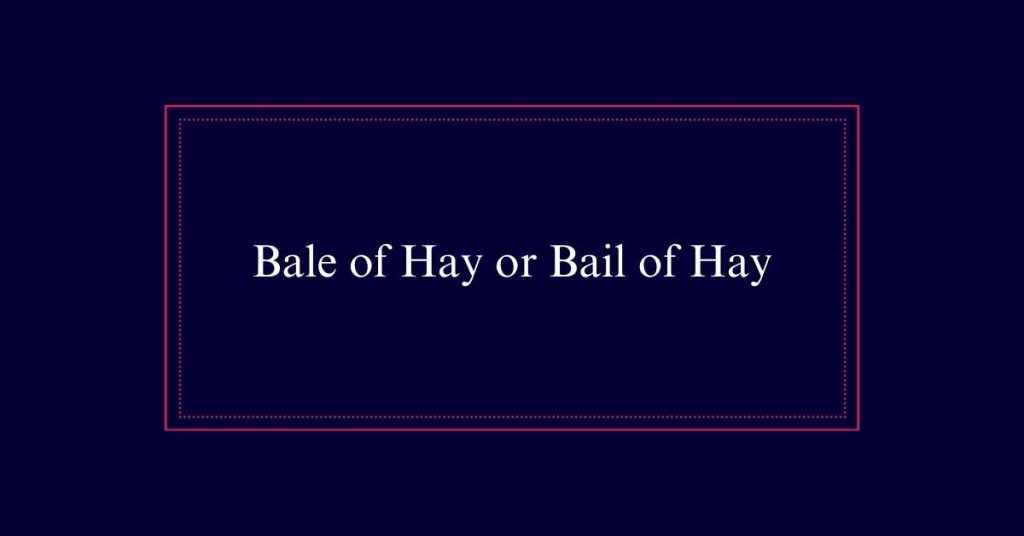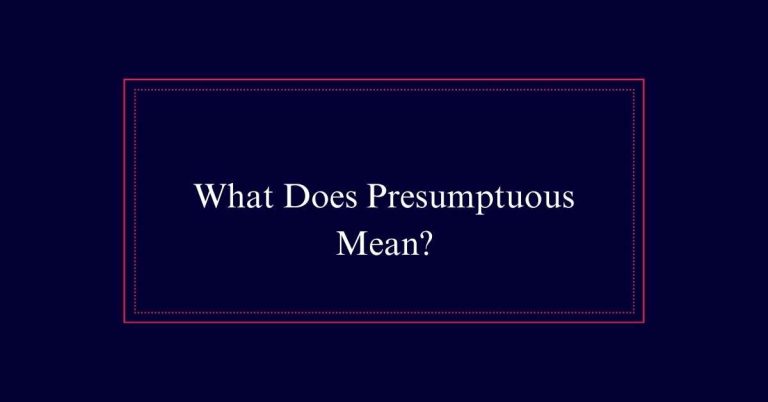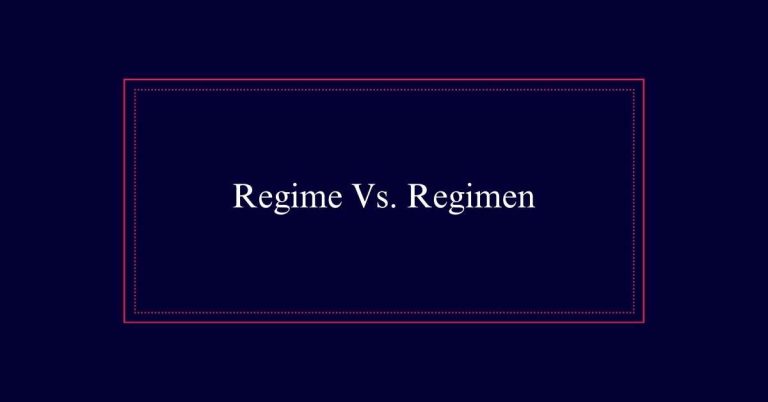Bale of Hay or Bail of Hay
The correct term for a large bound stack of hay is ‘bale of hay.’ A ‘bale’ refers to tightly bound packages of materials like hay, cotton, or leather, making them easier to store and transport. In contrast, ‘bail’ pertains to the temporary release of an accused person, typically secured by a monetary deposit, ensuring their return for court proceedings.
Common mistakes arise from confusing these homophones. Farmers ‘bale’ hay; individuals ‘post bail’ for release from custody.
Definition of Bale
A ‘bale’ is a large bound stack of material, often seen with hay, cotton, or leather. This compact form makes storage and transportation easier. Farmers commonly bale hay to feed livestock. The process involves cutting, drying, and compressing the hay into dense stacks.
Cotton is also baled after harvesting for efficient handling and shipping to textile mills. Leather, when tanned, is often baled to keep the hides organized and protected. The verb ‘bale’ refers to the act of binding these materials into a stack.
Historically, ‘bale’ also meant great evil or sorrow, but this usage is now rare. The adjective ‘baleful’ still carries a hint of this older meaning, describing something menacing or harmful.
Definition of Bail
In legal terms, ‘bail’ refers to the temporary release of an accused person awaiting trial, typically secured by a monetary deposit. This guarantees the individual’s return for court proceedings. Bail is a critical component of the justice system, balancing the presumption of innocence with public safety.
| Term | Definition |
|---|---|
| Bail | Temporary release of an accused person |
| Bond | A financial guarantee for bail |
| Surety | A person who takes responsibility for the accused |
| Remand | Keeping an accused in custody until trial |
| Forfeit | Losing bail money due to non-compliance |
Usage of Bale
While ‘bail’ pertains to legal matters, ‘bale’ refers to a large bound stack of materials like hay or leather.
Farmers often create bales of hay to store and transport it efficiently. The verb ‘bale’ is used when binding materials together into these compact forms.

Historically, ‘bale’ also meant great evil or sorrow, although this usage is now obsolete. The adjective ‘baleful’ still carries traces of this old meaning, describing something menacing or harmful.
In British English, ‘bale’ can replace ‘bail’ in certain phrasal verbs, adding to the word’s flexibility.
Usage of Bail
‘Bail’ commonly refers to the temporary release of a person accused of a crime, secured by a monetary deposit or bond. This legal domain term guarantees that the accused returns for court proceedings. The verb form, ‘to bail,’ describes the act of securing this release.
Additionally, ‘bail’ appears in various contexts outside the legal sphere. For instance, ‘bail out’ can mean providing financial assistance or escaping a situation, like jumping out of an airplane with a parachute. In informal usage, ‘bail on’ signifies abandoning someone or backing out of a commitment.
Historical Background of Bale
The term ‘bale’ historically signified great evil, woe, or sorrow. This usage dates back to Old English and Middle English literature, where it conveyed intense suffering or dire misfortune.
Over time, the meaning of ‘bale’ evolved. By the 15th century, it also came to describe a large, bound package of goods, such as hay, cotton, or leather. This shift in meaning likely stemmed from the practical need to describe the bundling of materials for transport and storage.
The verb form ‘to bale’ emerged, referring specifically to the act of binding materials into bales. Despite its historical connotations of sorrow, today ‘bale’ is primarily associated with agricultural and industrial contexts.
Historical Background of Bail
Originating from an archaic term, ‘bail’ initially referred to a ship’s bucket used for removing water. Over time, the term evolved and found its way into legal language. It came to signify the temporary release of an accused person awaiting trial. This legal use of ‘bail’ is now common across various judicial systems.
| Term | Meaning |
|---|---|
| Original | Ship’s bucket for removing water |
| Legal Use | Temporary release from custody |
| Phrasal Use | ‘Bail out’ – financial assistance or escape |
Phrasal Verbs With Bale
While ‘bail’ has significant legal implications, ‘bale’ finds its place in various practical applications, including several phrasal verbs.
One common phrasal verb is ‘bale out,’ which refers to the act of removing water from a boat. This action is important to prevent sinking.
Another usage is ‘bale up,’ which means to gather and bind materials into a bale. For example, farmers often bale up hay during harvest season.
These phrasal verbs highlight the utility of ‘bale’ in different contexts. Understanding these applications helps clarify the distinct functions of the word. Therefore, ‘bale’ is not just about large bound stacks; it plays a role in various essential activities.
Phrasal Verbs With Bail
Understanding phrasal verbs with ‘bail’ can clarify its diverse applications beyond the legal context. For instance, ‘bail out’ can mean to help someone in a difficult situation, not just jumping from an airplane. It also refers to removing water from a boat.
Another common phrasal verb is ‘bail on,’ which means to abandon or let someone down. These uses highlight how ‘bail’ functions in everyday language.
Though ‘bail’ is often linked to the legal world, its phrasal verbs show its broader utility. Knowing these meanings can prevent misunderstandings and promote clear communication.
Common Mistakes
Despite understanding the various uses of ‘bail,’ it’s easy to make mistakes when distinguishing it from ‘bale.’
One common error is using ‘bail’ when referring to a bundle of materials, such as hay. ‘Bale’ is the correct term for a large bound stack of items.
Another mistake is confusing ‘bail out’ in financial contexts with ‘bale out,’ which does not exist.
In legal settings, ‘bail’ refers to temporary release from custody, not ‘bale.’
These errors often occur because ‘bail’ and ‘bale’ are homophones, sounding the same but having different meanings.
Examples in Sentences
To illustrate the proper usage of ‘bale’ and ‘bail,’ consider these examples in different contexts:
Bale:
‘The farmer stacked a bale of hay in the barn.’
Bail:
‘She had to post bail to get her friend out of jail.’
Bale (Verb):
‘They decided to bale the hay before the storm arrived.’
Bail (Phrasal Verb):
‘He had to bail out of the failing business to avoid further losses.’






